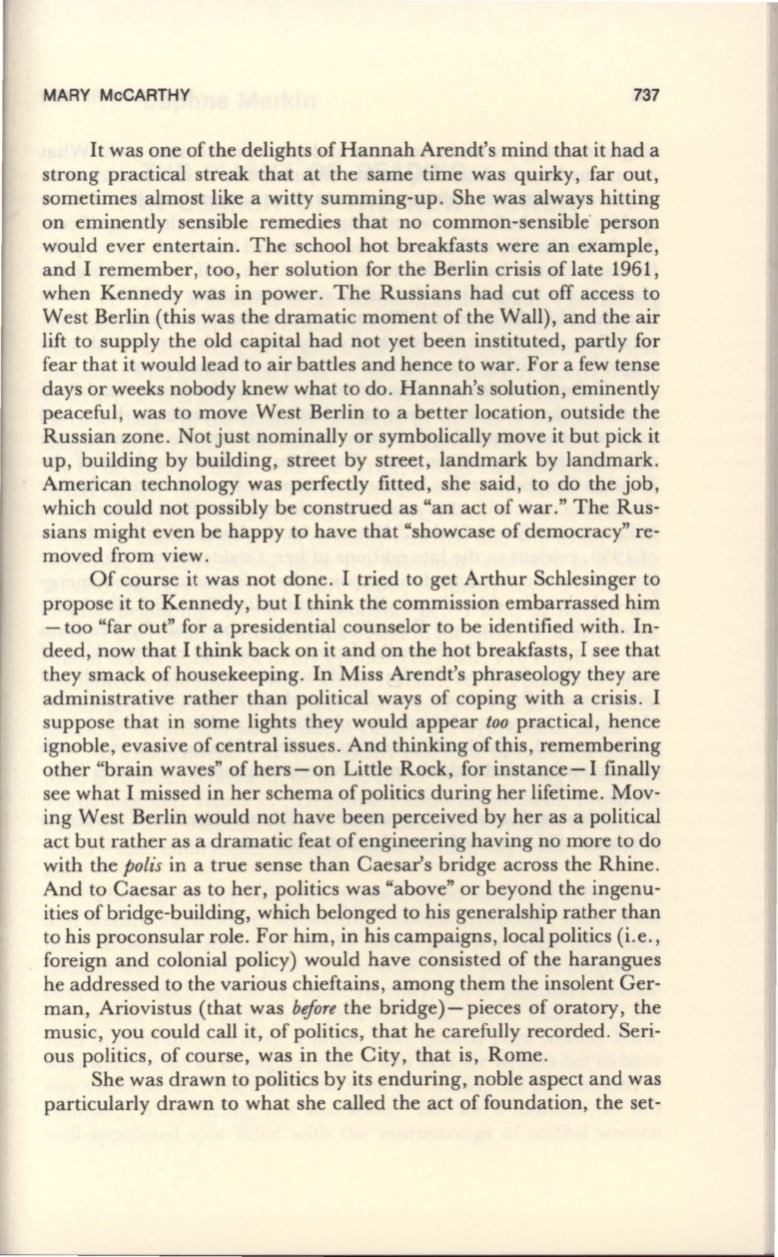
MARY McCARTHY
737
It was one of the delights of Hannah Arendt's mind that it had a
strong practical streak that at the same time was quirky, far out,
sometimes almost like a witty summing-up. She was always hitting
on eminently sensible remedies that no common-sensible· person
would ever entertain. The school hot breakfasts were an example,
and I remember, too, her solution for the Berlin crisis of late 1961,
when Kennedy was in power. The Russians had cut off access to
West Berlin (this was the dramatic moment of the Wall), and the air
lift to supply the old capital had not yet been instituted, partly for
fear that it would lead to air battles and hence to war. For a few tense
days or weeks nobody knew what to do. Hannah's solution, eminently
peaceful, was to move West Berlin to a better location, outside the
Russian zone. Not just nominally or symbolically move it but pick it
up, building by building, street by street, landmark by landmark.
American technology was perfectly fitted, she said, to do the job,
which could not possibly be construed as "an act of war." The Rus–
sians might even be happy to have that "showcase of democracy" re–
moved from view.
Of course it was not done. I tried to get Arthur Schlesinger to
propose it to Kennedy, but I think the commission embarrassed him
-too "far out" for a presidential counselor to be identified with. In–
deed, now that I think back on it and on the hot breakfasts, I see that
they smack of housekeeping. In Miss Arendt's phraseology they are
administrative rather than political ways of coping with a crisis. I
suppose that in some lights they would appear
too
practical, hence
ignoble, evasive of central issues. And thinking of this, remembering
other "brain waves" of hers- on Little Rock, for instance- I finally
see what I missed in her schema of politics during her lifetime. Mov–
ing West Berlin would not have been perceived by her as a political
act but rather as a dramatic feat of engineering having no more to do
with the
polis
in a true sense than Caesar's bridge across the Rhine.
And to Caesar as to her, politics was "above" or beyond the ingenu–
ities of bridge-building, which belonged to his generalship rather than
to his proconsular role. For him, in his campaigns, local politics (i.e.,
foreign and colonial policy) would have consisted of the harangues
he addressed to the various chieftains, among them the insolent Ger–
man, Ariovistus (that was
before
the bridge)-pieces of oratory, the
music, you could call it, of politics, that he carefully recorded. Seri–
ous politics, of course, was in the City, that is, Rome.
She was drawn to politics by its enduring, noble aspect and was
particularly drawn to what she called the act of foundation, the set-


